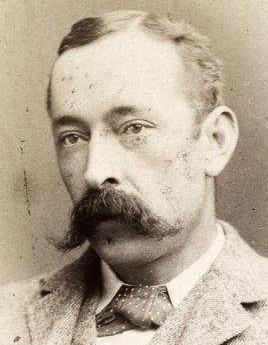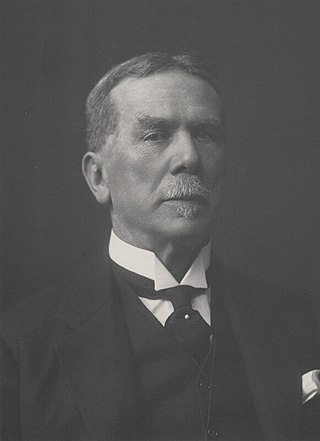
Sir Leander Starr Jameson, 1st Baronet,, was a British colonial politician, who was best known for his involvement in the ill-fated Jameson Raid.

The British South Africa Company was chartered in 1889 following the amalgamation of Cecil Rhodes' Central Search Association and the London-based Exploring Company Ltd, which had originally competed to capitalize on the expected mineral wealth of Mashonaland but united because of common economic interests and to secure British government backing. The company received a Royal Charter modelled on that of the British East India Company. Its first directors included The 2nd Duke of Abercorn, Rhodes himself, and the South African financier Alfred Beit. Rhodes hoped BSAC would promote colonisation and economic exploitation across much of south-central Africa, as part of the "Scramble for Africa". However, his main focus was south of the Zambezi, in Mashonaland and the coastal areas to its east, from which he believed the Portuguese could be removed by payment or force, and in the Transvaal, which he hoped would return to British control.

Rhodesia, known initially as Zambesia, is a historical region in southern Africa whose formal boundaries evolved between the 1890s and 1980. Demarcated and named by the British South Africa Company (BSAC), which governed it until the 1920s, it thereafter saw administration by various authorities. It was bisected by a natural border, the Zambezi. The territory to the north of the Zambezi was officially designated Northern Rhodesia by the company, and has been Zambia since 1964; that to the south, which the company dubbed Southern Rhodesia, became Zimbabwe in 1980. Northern and Southern Rhodesia were sometimes informally called "the Rhodesias".

Arthur Lawley, 6th Baron Wenlock, was a British colonial administrator who served variously as Administrator of Matabeleland, Governor of Western Australia, Lieutenant-Governor of the Transvaal, and Governor of Madras. The fourth and youngest son of the 2nd Baron Wenlock, he attended Eton College and Trinity College, Cambridge, before joining the military. Serving in the Mahdist War, he reached the rank of captain before resigning his commission to pursue other interests. Lawley was then private secretary to his uncle, the 1st Duke of Westminster, and subsequently to the 4th Earl Grey, who he followed to Rhodesia.

Sir Charles Patrick John Coghlan,, was a lawyer and politician who served as Premier of Southern Rhodesia from 1 October 1923 to his death. Having led the responsible government movement in the territory during the latter days of Company rule, he was Southern Rhodesia's first head of government after it became a self-governing colony within the British Empire.
Sir William Henry Milton was the third Administrator of Mashonaland, played rugby for England and was South Africa's second Test cricket captain.
Chief magistrate is a public official, executive or judicial, whose office is the highest in its class. Historically, the two different meanings of magistrate have often overlapped and refer to, as the case may be, to a major political and administrative officer or a judge and barrister.
Legislative Council elections were held in Southern Rhodesia on 17 April 1899. They were the first elections to take place in the colony and followed the Southern Rhodesia Order in Council of 1898 which granted the colony a Legislative Council consisting of at least ten voting members: the Administrator of Southern Rhodesia ex officio, five members nominated by the British South Africa Company, and four members elected by registered voters. The Resident Commissioner of Southern Rhodesia, Sir Marshal James Clarke, also sat on the Legislative Council ex officio but without the right to vote.
Sir Raleigh Grey was a British coloniser of Southern Rhodesia who played an important part in the early government of the colony.
The Southern Rhodesia Legislative Council election of March 17, 1902 was the second election to the Legislative Council of Southern Rhodesia. No change was made in the administration of the elections compared with the first elections three years previously, so the Legislative Council continued to comprise ten voting members: the Administrator of Southern Rhodesia ex officio, five members nominated by the British South Africa Company, and four members elected by registered voters from two electoral districts. The Resident Commissioner of Southern Rhodesia, Sir Marshal James Clarke, also sat on the Legislative Council ex officio but without the right to vote.
The Southern Rhodesia Legislative Council election of 1905 was the third election to the Legislative Council of Southern Rhodesia. The Legislative Council had, since 1903, comprised fifteen voting members: the Administrator of Southern Rhodesia ex officio, seven members nominated by the British South Africa Company, and seven members elected by registered voters from four electoral districts. The Resident Commissioner of Southern Rhodesia, Richard Chester-Master, also sat on the Legislative Council ex officio but without the right to vote.
Legislative Council elections were held in Southern Rhodesia on 30 April 1920, the seventh elections to the Legislative Council.
The Rt Hon. Sir Robert Clarkson Tredgold, KCMG, PC, was a Rhodesian barrister, judge and politician.
Sir Francis Drummond Percy Chaplin served as administrator for the British South Africa Company in Southern Rhodesia from 1914 to 1923. He succeeded William Milton.

Archibald Ross Colquhoun was a British explorer and the first Administrator of Southern Rhodesia. He held office from October 1890 until September 1892, the period of the founding of Fort Salisbury after the arrival of the Pioneer Column. At this time the administrator's jurisdiction covered Mashonaland only, as Matabeleland was annexed in 1893. He was also acting Chief Magistrate of Southern Rhodesia between 24 July 1891 and 18 September 1891.
Europeans first came to the region in southern Africa today called Zimbabwe in the sixteenth century, when Portuguese colonials ventured inland from Mozambique and attacked the Kingdom of Mutapa, which then controlled an area roughly equivalent to eastern Zimbabwe and western Mozambique. Portuguese influence over Mutapa endured for about two centuries before fading away during the 1690s and early-1700s (decade). During the year of 1685, French Huguenots emigrated to present-day South Africa and whilst some settled there, others moved further north into the continent. Those who did, settled within modern-day Zimbabwe, Mozambique and Botswana, and co-existed with the indigenous people; most of whom, in Zimbabwe, were the Naletale people.
Lieutenant-Colonel Sir Marshal James Clarke was a British colonial administrator and an officer of the Royal Artillery. He was the first Resident Commissioner in Basutoland from 1884 to 1893; Resident Commissioner in Zululand from 1893 to 1898; and, following the botched Jameson Raid, the first Resident Commissioner in Southern Rhodesia from 1898 to 1905.

Sir Francis James Newton was a senior colonial administrator in different parts of the British Empire, principally in Southern Rhodesia.
Sir Edward Charles Frederick Garraway, KCMG was an Irish-born doctor and British colonial administrator who served as British Resident Commissioner in Bechuanaland and Basutoland.






